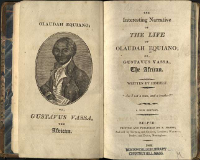The Interesting Narrative of the Life of Olaudah Equiano, or Gustavus Vassa, the African is the title of an autobiography written by an African man who survived the journey across the Atlantic Ocean in a slave ship, bought his own freedom, and became famous for telling his story. 
Equiano was born in 1745 in Eboe, in what is now Nigeria. He was not yet 10 years old when he and his sister were captured and put aboard a slave ship bound for Barbados. It was in his book, published in 1789, that he described the horrors of the Atlantic journey, known as the Middle Passage. Among the things that he wrote about in his book are these: "Every circumstance I met with served only to render my state more painful, and heighten my apprehensions, and my opinion of the cruelty of the whites. One day they had taken a number of fishes; and when they had killed and satisfied themselves with as many as they thought fit, to our astonishment who were on the deck, rather than give any of them to us to eat as we expected, they tossed the remaining fish into the sea again, although we begged and prayed for some as well as we could, but in vain; and some of my countrymen, being pressed by hunger, took an opportunity, when they thought no one saw them, of trying to get a little privately; but they were discovered, and the attempt procured them some very severe floggings." 
"At last, when the ship we were in had got in all her cargo, they made ready with many fearful noises, and we were all put under deck, so that we could not see how they managed the vessel. But this disappointment was the least of my sorrow. The stench of the hold while we were on the coast was so intolerably loathsome, that it was dangerous to remain there for any time, and some of us had been permitted to stay on the deck for the fresh air; but now that the whole ship's cargo were confined together, it became absolutely pestilential. The closeness of the place, and the heat of the climate, added to the number in the ship, which was so crowded that each had scarcely room to turn himself, almost suffocated us. This produced copious perspirations, so that the air soon became unfit for respiration, from a variety of loathsome smells, and brought on a sickness among the slaves, of which many died, thus falling victims to the improvident avarice, as I may call it, of their purchasers. This wretched situation was again aggravated by the galling of the chains, now become insupportable; and the filth of the necessary tubs, into which the children often fell, and were almost suffocated. The shrieks of the women, and the groans of the dying, rendered the whole a scene of horror almost inconceivable." Equiano survived that harrowing journey and, after landing in Barbados, found himself the property of Lt. Michael Pascal, a British naval officer stationed in the Virginia colony. Pascal gave Equiano a new name: Gustavus Vassa, after a 16th Century Swedish monarch. Equiano traveled extensively with Pascal, learning much about sailing in the process. During the Seven Years War, Equiano's job aboard Pascal's ship was to haul gunpowder to the gun decks. Pascal then sent Equiano to London, to live with Pascal's sister-in-law and go to school. Pascal still thought of himself as Equiano's owner, however, and sold him to James Doran, a ship's captain bound for the Caribbean. That captain sold Equiano in 1763 to another man, Robert King, who lived in Philadelphia. King right away saw the value of keeping Equiano out of the fields and ordered him to work in the trading aspects of King's business. Three years later, Equiano bought his freedom. Equiano returned to the sea and sailed the Atlantic and the Mediterranean, undertaking a handful of scientific explorations, including one aboard the British Navy ship Racehorse, which was seeking a northern route to India. He made his way back to London and joined anti-slavery efforts there, in particular joining a group called the Sons of Africa. By now fluent in English and an excellent reader, he joined debating societies, including the famous London Corresponding Society. He also learned to play the French horn. 
Equiano published his book in 1789, and it brought him much fame and a bit of fortune. He traveled to promote his book, throughout England and to Ireland and Scotland as well. He traveled to Sierra Leone for a time, working in that colony, which had been founded for freed slaves. He married an English woman named Susannah Cullen in 1792, and they had two daughters, Joanna and Anna Maria. He remained active in the anti-slavery movement until he died, in 1797. His book was influential in convincing Britain's Parliament to pass the Slave Trade Act of 1807, which abolished the African slave trade. |
|
Social Studies for Kids
copyright 2002–2025
David White




